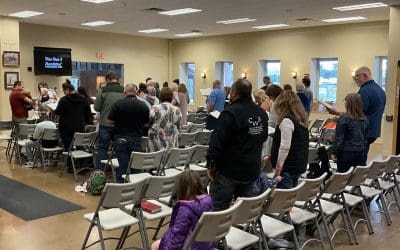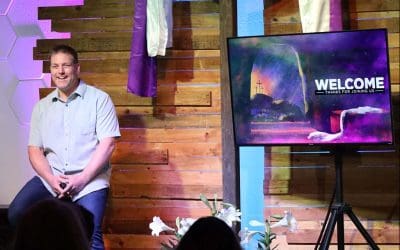Written by Pastor Gideon Johnson
Lessons Learned in Rural Church Ministry
Near the beginning of his classic biography on Martin Luther (Here I Stand), Roland H. Bainton writes something you may not know about Luther. He writes,
Returning from Rome, Luther came under new influences due to a change of residence. He was transferred from Erfurt to Wittenberg, where he was to pass the remainder of his days. In comparison with Erfurt, Wittenberg was but a village with a population of only 2,000 to 2,500. The whole length of the town was only nine tenths of a mile.
Yes, you read that right. Martin Luther was a rural pastor.
Certainly by quoting this I’m not arguing that, because Martin Luther found his calling in such a small place, rural ministry trumps or is more important than urban ministry. Rather, it’s simply my way of showing that, like urban ministry, rural ministry has always been a reality in the life of the church; not only beginning with Luther and the Reformation, but reaching all the way back to the time of Jesus’ ministry.
Of course, as is the case in any area of ministry, with rural ministry comes certain lessons learned that I believe are important to highlight and keep in mind as one ministers in these small places.
LESSON #1: They Need the Gospel Too
Over the past several years, going back further than my and even your life even extends, there has been a concerted emphasis and effort in the United States and beyond to reach the cities or urban centers with the gospel. Of course, this emphasis and effort is understandable. For example, speaking practically, cities or urban areas have far more people clustered together in one locality than is the case in rural areas, where people are much more spread out. So you, in a sense, can get more bang for your buck when it comes to gospel ministry in these places.
Additionally, both mankind’s sin and desperate need for Jesus may seem that much more evident in the urban than the rural (though, I’d argue, evident isn’t the same as prevalent). Therefore, it could be argued, with a more evident need, there may be more open doors or receptiveness to gospel ministry in these places.
And, finally, in general, the flow of culture seems to find its epicenter in the urban rather than the rural. Therefore, the argument could be, if we want to shift our culture back to more of a Christian worldview it would make sense to prioritize urban ministry over rural.
All of this is true!
Yet, that said, the first lesson anyone in or going in to rural ministry must learn and keep at the forefront of their minds is that people in rural areas need the gospel too.
Of course, this should and does go without saying. Yet, I think it’s important to be said and, more importantly, to keep in mind because we are prone to forget it. So, let me reinforce the point by saying it again. Rural people need the gospel too. Why? Because, as much as we’d like it to be the case and are maybe even tempted to believe, they aren’t, by result of their being born in rural America, free of sin and it’s eternal consequences. Or, to put it in more political terms, the fact that the rural is usually red on the electoral maps, doesn’t mean the blood of Jesus automatically covers these areas.
Certainly, to restate what I said before, sin may not be as evident in rural communities, but I can guarantee you it’s just as prevalent and maybe even more insidious. That’s why they need the gospel too. And that’s why they need gospel-focused ministers and congregations who will give them Jesus. Because, whether urban or rural, Jesus is the answer for everyone.
In his book A Big Gospel in Small Places, which I would recommend to everyone, whether in urban or rural ministry, Stephen Witmer writes, “More than three billion people around the world today — nearly half the world’s population — live in rural areas. … And many of these people do not know Jesus. … [Therefore,] if these billions of souls are to be reached with the gospel, we must go” (5).
See, gospel ministry in the rural is not a matter of practicality. It’s a matter of necessity. These people and places need the gospel too.
LESSON #2: They Need To Hear and Know the Truth
It’s 100% true, rural communities tend to be more politically conservative than urban communities (hence the overwhelming red color on electoral maps).
That said, here’s what’s not necessarily true, rural churches tend to be more theologically conservative than urban (*note: when referring to theologically conservative churches, I’m referring to those churches that have a high view of Scripture; believing the Bible is the inspired, inerrant, and authoritative Word of God).
Certainly that’s not to say that the people themselves are necessarily liberal in their theology (though that might be the case), but, unfortunately, through historic creep, the churches many of them have and continue to attend are liberal in their theology. Which means that these precious souls are slowly but surely being led to hear and believe what is false and contrary to the truth of God’s Word.
Taking my own experience as an example, in the three churches I’ve served in my short time of ministry (two churches being part of the same parish), there have been at least 9 liberal Lutheran churches in the immediate vicinity, which doesn’t even include other liberal-confessing denominations such as the United Methodists, Presbyterian Church USA, etc. Again, that’s not to say these congregations weren’t once more conservative than they now are, but this is the drift that’s occurred and has been and is being passed down from the pastor to the pew.
Of course, for those in rural church ministry, what this means is working to break the mold of bad theology and building in its place a better theology, which is to say a true theology that’s in accordance with the Word.
How is that done?
Not necessarily by stepping in swinging, but by rightly, faithfully, consistently, boldly, and lovingly handling the Word of Truth in preaching and teaching, and by modeling that truth to those around.
Yes, rural people need to hear and know the truth.
LESSON #3: They Don’t Need It Dumbed Down
Though not always the case, it could be said that people living in rural areas tend to live a little more simply than those in urban areas. (Which, in all honesty, might be part of the reason these ones choose to live in such areas, but that’s beside the point). That said, when doing rural ministry, we should never think that simple people are stupid people and, as a result, can’t comprehend deep or profound truth. In fact, on the contrary, far from being stupid (which, according to the dictionary means “lacking intelligence or common sense”), rural people are extremely wise and knowledgable. With that, though maybe more practical than theoretical, they are just as capable as anyone of taking in and grappling with deep theological truth. More than that, I’d argue they want to grapple with deep truth.
So, what’s the lesson when it comes to rural ministry? Certainly contextualize the truth. In other words, speak the people’s language. But don’t dumb the truth because you think they can’t handle it. They can handle it. They want to handle it. I’d argue, they need to be allowed to handle it. After all, God’s Word and everything in it is for the whole church, not just select churches we deem more able than others.
LESSON #4: They Want To Trust You
When an outsider comes into a rural community, it can be daunting, maybe even a little intimidating. After all, rural communities tend to be older with not much regular or ongoing change. This means rural people know who they know and they know who they can trust, which means they likely will not immediately trust you.
Now, in Killdeer, ND (the place I currently ministry in) where, because of the oil boom, there’s been a lot of people coming in and going out over the past several years, this is not so much the case. Because of the constant inflow and outflow of people, I think the community has gotten rather used to this idea and reality of welcoming new people in.
But, still, when it comes to trusting them that takes times. Most rural people aren’t necessarily just going to throw their arms around you and throw in their lot with you.
And now imagine being a new pastor in a newer church in a rural community. Same rules apply.
It’s not that people in such communities don’t want to trust you or are adverse to throwing in their lot with you. It just takes time and effort. They need to know that they can trust you; that you’ll be there for them when they need it most and in the mean-time too.
And that’s another lesson that I’ve learned in rural ministry. Again, it’s not that people don’t want to trust you, it just takes some time and effort. That effort includes:
- Faithfully speaking the truth to them.
- Boldly and lovingly sharing the Law and the Gospel with them, which is telling them what they need to hear, not just what they want to hear.
- Loving them as Christ loved the Church, which means more than just preaching to them. It means rubbing shoulders with them, going out of your way for them, doing what’s loved and appreciated by them, learning about them, listening to them, and always, always being willing to learn from them, instead of always being the one instructing them.
Yes, they want trust you. Therefore, give them reason to trust you.
So, there you have it, 4 Lessons Learned in Rural Church Ministry. Have there been more? Absolutely! Will there be more? I hope so. Can these lessons apply to all contexts of ministry? A rounding, yes!
So, what should you do or how does this apply? Thinking especially of pastors who are called to these small places:
- Let it be your burden to give your people the Gospel.
- Let it be your goal to be bold and precise in preaching and teaching to them what is true.
- Let it be your privilege to stretch and challenge and excite them in knowing and grappling with what is “the breadth and length and height and depth” of the eternal truths of God. (Eph. 3:18)
- Let it be your desire that they come to trust you and your congregation with the care of their souls. More than that, let your desire be that they come to trust Jesus through you.
The Lutheran Church PLanter
Join us on your favorite podcasting platform for church planting encouragement and practical tips.
Let's connect
Interested in learning more about how you can be part of a church planting movement in this generation? Reach out to start a discussion!
Recent Posts
How to Plant a church
HOW TO PLANT A CHURCH IN SIX (NOT SO) EASY STEPS Our culture today is infatuated with “Life hacks” and “3 Easy Step” methods to achieve desired...
Can You Imagine?
What if there was a place where the sovereign, transcendent, eternal, and loving God promised to be substantially present with you in a regular and...
What’s Unique about us?
Unique What is it that Free Lutherans can offer to the broader church planting movement in America? What gifts do we have? Is there something unique...





0 Comments